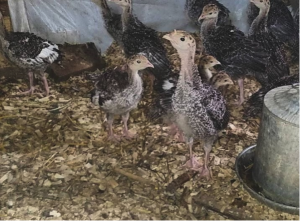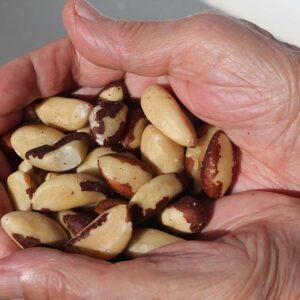
Is Organic Turkey Healthier?
Dear Living Well Daily Reader,
I have a bag of rooster heads and rooster feet in my freezer.
My sister, an organic farmer, sold me the recently butchered roosters this weekend when she was up visiting from the Eastern Shore of Maryland. I wanted whole birds to make bone broth and had read that the feet and combs can add lots of good collagen to the broth.
I asked her to save me the combs, and she gave me the whole heads.
(I got the livers too!)
“This is probably a silly question,” I asked her, “but does rooster taste the same as other chicken?”
“I’ve eaten only one before,” she told me. “It was when we first got Rudy,” her beloved pet pig, “and this rooster kept pecking at him, so we killed it. It was the best tasting chicken I ever had.”

Rudy, safe from the big bad rooster
I baked the organic, pastured rooster on Sunday, and I have to admit, it was different than a typical broiler, even the organic ones I buy at MOM’s Organic Market. It was leaner with less meat, and the dark meat was very dark.
But it was good.
Even though I paid a pretty penny for each of them, I feel so much better knowing that I’m eating a bird that’s lived a happy life, never been given antibiotics or other drugs, ate plenty of bugs and grub rich with omega-3s, which are beneficial for heart and brain health, and fed only organic feed.
And this Thanksgiving, for the first time ever, we will be eating organic, pastured turkey that she raised.
As I imagine many of you are getting ready to go buy your turkey for next week’s dinner, I thought for this episode of Living Well Daily, we could dive into the question of whether or not you should go organic.
Is it really healthier? Is it worth the extra money? Will eating organic meat one day a year make a difference?

My sister’s turkeys as chicks
First, let’s get one thing out of the way: If you see “cage free” “hormone free/raised without hormones” or “natural” on any poultry, understand these labels mean just about nothing. All poultry raised for meat must be cage free, and hormones are not allowed. And “natural” means only that nothing synthetic has been added to the meat and it has only been minimally processed.
But then there’s “organic.” And then there’s “pastured poultry.”
“Organic” means the birds were raised without antibiotics and fed only organic feed. The birds also must have had access to the outdoors, but that could mean a bare patch of dirt or concrete slab. It doesn’t mean they were able to peck for grubs.
“Pastured poultry” (sometimes called “free range”) has been allowed to roam outside and eat a natural diet of bugs, which can increase their omega-3 content up to 38%. They are typically supplemented with feed that may or may not be organic depending on if the meat has both labels. Also, because they are given more space, pastured birds are less likely to get infections and need antibiotics.
Conventional turkeys are raised in very close quarters and are typically given antibiotics to prevent infections. And according to the Poultry Science Association, many turkey producers add antibiotics to the feed to make the turkeys grow faster and larger.

Conventional turkeys are raised in extremely close quarters
Choosing antibiotic-free meat is one of the most important food choices you can make. Antibiotic-resistant bacteria is swiftly becoming a serious worldwide epidemic, contributing to the rise in untreatable and deadly infections. In addition, when we ingest antibiotic-laced meat, it can alter our own intestinal flora and cause gut dysbiosis (an imbalance of helpful microbes in the stomach).
And remember how turkey farmers give the bird antibiotics to plump them up? Researchers are hypothesizing that excessive antibiotic consumption in humans could be a contributing factor to weight gain and the obesity epidemic.
Another reason to consider buying organic is if you are at all concerned with the use of pesticides and GMOs. Conventional birds are fed pesticide-laden corn and soy that is likely genetically modified, and the EPA reports that nonorganic meat has higher levels of pesticides than any plant food.
In fact, if you can afford to buy only one thing organic, make it your meats.
Buying organic could also help lower your risk of food poisoning. Though it was done on chickens, not turkeys, one study found that only 6% of organic birds were infected with salmonella, compared with 39% of conventional ones.
(Whether you buy organic or conventional, always be sure to cook poultry thoroughly and use a meat thermometer to make sure the meat is at least 165 degrees.)
Other than the omega-3 content, organic poultry hasn’t been shown to have any significant differences from conventional meat from a nutrient standpoint. However, buying organic, antibiotic-free meat is always a good idea, both for your health and the health of the planet.
Antibiotic-free organic turkeys may be hard to find, as they are only about 2.3% of the total number of turkeys produced each year in the U.S. And pastured poultry is even harder to find. Wegmans and Whole Foods both sell organic turkeys. And www.localharvest.org can help you find a farmer near you so you can buy one directly from them.
If you do decide to go organic, prepare yourself for sticker shock. While a conventionally raised Butterball turkey typically sells for $0.99 per pound, organic turkey may be as much as five times that price. My local Wegmans sells organic turkeys for $4.99 per pound, and Whole Foods has them for $3.99 per pound.
But to me, that’s worth it.
To living well,

Jasmine LeMaster
P.S. As for those rooster heads and feet? Well, they are still chilling out in my freezer. I promise to report back with lots of photos of my broth-making experience.
View More Free Articles
Take the SHORTER Path to Dramatically Better Health
Are you tired of fitness gurus preaching the virtues of 5 AM workouts and pushing Olympic-level training regimens? Their narrative can feel exhausting and entirely unattainable. But before you toss in the towel completely, I’ve got news that might just put a spring back into your step. A groundbreaking new study reveals that the key...
Unexpected Perks of Your Coffee Habit Revealed!
We all know that the first cup of coffee in the morning can FEEL like a lifesaver. But what if it might actually BE saving your life? A groundbreaking new study suggests that your daily coffee habit could be protecting you from not just one but multiple chronic diseases. Let’s pour over this fascinating research…...
The TRUTH About Diabetes Drugs and Brain Aging
You’ve probably seen the gushing headlines… Most say something like, “Common diabetes drug protects the brain against aging!” And let’s face it, that sounds fantastic. After all, who doesn’t want to keep their brain young and in tip-top shape? The headlines refer to the results of a new study that suggests the widely prescribed type...
Hidden Smartphone Danger Puts You at Risk
Remember when we thought cell phones were just something for young folks to obsess over? Back when we were convinced they were nothing more than a passing fad? Well, times certainly have changed. Now, most people… including many of us older folks… have jumped on the smartphone bandwagon. Heck, some of us are practically as...
Preserve Your Mobility with “Agile Aging” Exercises
Aging has a way of humbling us. You lose hair where you want to keep it—and often end up growing it where you don’t. With every passing year, your eyesight fades, and your waistline expands. And as your once quick pace begins to slow, you fear developing the dreaded “senior shuffle.” But here’s the thing....
Yes, Lazy Saturday Lie-Ins Can BOOST Your Health
Are you burning the midnight oil during the week and catching up on sleep on weekends? Well, I’ve got some news that might help you feel less guilty about those lazy Saturday mornings. A new study suggests that weekend lie-ins might be doing far more than just helping you feel refreshed. Experts say they could...
Mailbag: 7 Hidden Culprits Behind Your Weight Gain
“Why am I gaining weight, even though I am watching what I am eating?” – Battling the Bulge Dear Battling, Gaining weight when you’re not trying to is frustrating. And it just gets worse as we age… often regardless of our diet. The truth is that various factors can promote weight gain even when you’re...
Popular Artificial Sweetener Linked to Dangerous Heart Risk
Remember when erythritol was the darling of the health food world? Well, this popular sugar substitute might not be as sweet a deal as we were led to believe… A shocking new study reveals a dark side to this widely used artificial sweetener. It turns out erythritol is associated with a dangerous—and even deadly—heart risk....
Cracking the Code on Chronic Inflammation
Inflammation and obesity are the evil tag team at the heart of nearly every major disease we face—from diabetes to obesity. What starts as a normal, healthy process to fend off dangerous invaders can quickly fan into the flames of chronic inflammation… and that includes in your gut. The trouble is almost no one has...
Dreaming of Better Sleep? Your Gut Holds the Key
Do you toss and turn at night? If so, you’re not alone. In fact, if you’re a senior over 65, you join nearly 17 percent of your peers who ALSO struggle with poor sleep quality. But science has uncovered a natural supplement that not only could help you catch more Z’s but can also give...









